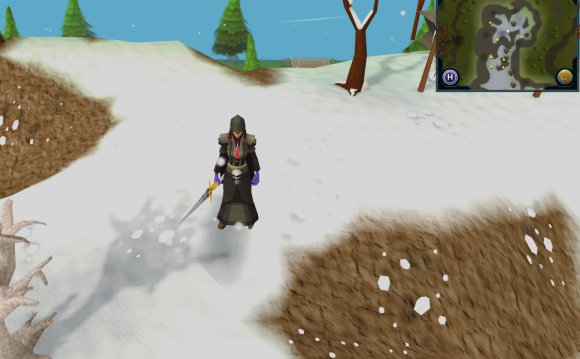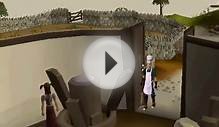
CookingIs a skill that allows a player to cook raw food into food that you can eat. Cooking goes hand in hand with the Fishing skill as the player can cook the fish they obtain shortly after a full inventory is made. If no stove/range is nearby, having an axe and tinderbox equipped can allow the player to cut down a tree and make a fire to cook the fish on (however, there is a significantly smaller chance of burning the food if it is used on a range). By levelling up Cooking the player is able to cook the more profitable foods such as lobsters, swordfish, monkfish and shark. By eating cooked food you gain lost Hitpoints which is useful for training your combat skills. Lobsters are popular among players that wish to train their combat as they heal a great deal of hitpoints and are considerably less expensive than sharks.
Cooking level-up music (link)
The first music that can be played when leveled up.
The second music that can be played when leveled up.
How to cook
Cooking is known as one of the fastest skills to train, as players can cook in many different ways as well as being able to simply buy their raw food items from the Grand Exchange.
Before the Grand Exchange was created, the bulk of players usually fished and then cooked their catches. Generally a player who is manually gathering their raw items will cook their food items on a local campfire created through the Firemaking skill near where they are gathering, or take the items they have obtained to a range and cook there.
Ranges (which provide a lower burn rate) can be easily located and are almost always well labelled on the map as a cooking pan icon. There are other assorted things that a player can cook on, such as sulphur vents, permanent campfires as seen in NPC camps, or on iron Spits. It is important to note that only meat, fish and stew can be cooked on an open fire. Foods like bread, cake, and pie must be cooked on a proper range, Most of these food items will generate an error message if the player attempts to cook it improperly while others, such as raw potatoes, will simply all burn. Raw foods loosely related to the Hunter skill, such as raw beast meat, raw chompy, and rabbit, must be cooked on an iron spit.
To actually cook something, players have to "use" their raw food item on a range or a campfire. If they have more than one food item of the same kind in their inventory, a picture of the food item will appear in the dialogue box. The player can right click on the picture and select how much he/she wants to cook. By default, you cook all the selected raw/uncooked item.
If this is your first time cooking follow these steps for maximum effect:
- Cooking at the Rogues' Den has a permanent fire and is directly next to a moving banker (Members only).
- If you do not want to spend much money in this skill, you can kill cows and cook the raw meat on the range or a fire.
Burning food
As players train cooking, they will sometimes fail to cook something at random. It is normal when you first begin training this skill to burn nearly anything you put before a fire or range, but as you gain more levels the burn ratio of food decreases until you reach the level where you can no longer burn them. A useful item to equip while training are cooking gauntlets. Wearing these gloves while training cooking will cut down time and money due to less food being burnt. This is useful for food such as sharks where even at 99 you have the chance to burn them; with the cooking gauntlets equipped you will stop burning sharks at level 94. Alternatively, cooking food while wearing a cooking cape will ensure that no food may be burned by the player.
All ranges have a lower burn rate than fires, but the range in Lumbridge castle has an even lower burn rate, however, to use it, you must have completed the Cook's Assistant quest. The nearest bank is the Culinaromancer's Chest in the cellar, which requires the first part of the Recipe for Disaster quest to be completed, or the bank at the top of Lumbridge Castle. This range has a reduced burn rate, however, only works on the following foods:
- Bread dough
- Redberry pies
- Meat pies
- Stew
- Beef
- Rat
- Chicken
- Undead chicken
- Undead beef
- Snails from Morytania
- Shrimp
- Anchovies
- Sardines
- Harrings
- Mackerel
- Giant Carp from Hemenster
- Trout
- Cod
- Pike
- Salmon
Items needed
As Cooking is the skill of turning food from raw to edible, and there is a very wide range of available food types in RuneScape, there are many items that players need in order to cook food. Depending on what you are cooking you will need a variety of items such as water or flour. Listed below are the cardinal cooking items which are used to make the most common types of food.
- Fish - (raw lobster, raw trout, etc.)
- Flour - (Held in a pot)
- Water - (Held in a bucket, bowl, vial or jug)
- Milk - (Held in a bucket)
- Meat - (Raw meat, raw rat meat, raw bear meat, raw yak meat, raw chicken)
- Vegetables - (Cabbages, grain, onions, raw potatoes)
- Fruits - (Cooking apples, grapes, bananas, redberries, tomatoes)
Other
| Picture | Name | Level | XP | Healing |
|---|---|---|---|---|
| 28 | 104 | 10% of maximum |
Brewing involves the fermenting of raw ingredients into ales or cider. Brewing may be considered quite useful since most of the ales boost certain stats. This can also make a number of ales valuable. It is, however, quite a slow process and so is not a viable means of training. The products are not useful for healing unlike most areas of cooking. There are two types of brew that can be made - ales and cider.
To brew ales, you have to use the fermenting vats located in either of the breweries in either Keldagrim or Port Phasmatys. Each place has only one vat, in which one ale can be brewed at a time. To start brewing ale, 2 buckets of water, 2 lots of Barley malt, the main ale ingredient, and a pot of ale yeast must be added to the fermenting vat (in that order). The main ingredient is specific to the type of ale being brewed. Once the ale yeast is added, the ale will begin fermenting. This will usually take several days to brew. Once it is done brewing, you can turn the valve between the vat and the attached barrel to move brewed ale to the barrel, and then collect the ale in Beer glasses or calquat kegs. The barrel will produce 8 doses of the ale. Ale in calquat kegs are in most cases considerably more valuable.
To make cider, you should first take 16 apples and 4 buckets to the cider barrel at one of the breweries in either Keldagrim or Port Phasmatys. 4 cooking apples should be added to and mushed in the barrel. An empty bucket should then be used to collect it in a bucket. Once 4 buckets are filled, add them to the fermenting vat, then add ale yeast into the fermenting vat. It will then start fermenting.
During the brewing process, it is possible for an ale to mature instead of brewing normally, in which case your fermenting vat will produce mature versions of the ales you have brewed, which have stronger effects—it is also possible, however, for an ale to turn bad, in which case the ale in your fermenting vat will become unusable.
All of the brews boost a certain skill, as shown in the table below. Some of the brews have a variable boost amount which is relative to the players level, boosting more as the players level increases.
* For a Mature Ale: Simply add +1 (or -1) to all stat effects of the basic ale. Example: Slayer's respite (m) Slayer: +2, Attack: -3, Strength: -3.
Gnome Cooking
Gnome cooking is very complicated, and is best left with its own specially dedicated guide. The gnome foods plays a big part in the Gnome Restaurant minigame, more detailed information can be found in article linked to above but following is a general guide for how a player can get acquainted with gnome cooking.
RELATED VIDEO




 Cooking is the process of preparing food, often with the use of heat. Cooking techniques and ingredients vary widely across the world, reflecting unique environmental, economic, and cultural traditions. Cooks themselves also vary widely in skill and training...
Cooking is the process of preparing food, often with the use of heat. Cooking techniques and ingredients vary widely across the world, reflecting unique environmental, economic, and cultural traditions. Cooks themselves also vary widely in skill and training...











